Gender Equality in the Justice System, a Global Issue
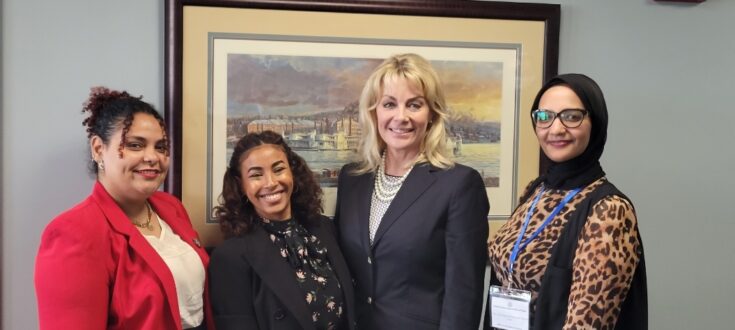
Last week, the World Affairs Council welcomed three legal professionals from Egypt. The goal of their program was to learn about gender equality in the American justice system: the struggles women face and also the achievements women have made in this field. These esteemed visitors had the privilege of meeting with Hamilton County Prosecutor, Melissa Powers, the Hamilton County Commission on Women and Girls with Commissioner Denise Driehaus, Dr. Jenner Dye of the University of Cincinnati’s JD/MA Women’s Gender and Sexuality Studies Program, the YWCA’s Rising Leadership Program, and the Cincinnati Bar Association- Women’s Bar Association with the Honorable Judge Janaya Trotter Bratton.
You might be wondering why it is so important for these Egyptian Delegates to learn about gender equality in the justice system. It’s 2023, hasn’t the world become more equal for women in all fields?
Well, the truth is that while we have made many strides in gender equality, women face many barriers in the justice field.
According to the Tahir Institute for Middle East Policy, Egypt has 16,000 male judges and a grand total of 66 female ones, making up a mere 0.4% of the country’s judges. These women were not appointed normally as their male counterparts are, but rather, selected from among the already appointed members in the Administrative Prosecution Authority and the Egyptian State Lawsuits Authority. Even this tiny percentage was appointed as cover to appease international standards and demands.
Hamilton CountyProsecutor Melissa Powers highlighted the many struggles she faced when beginning her career as an attorney. She stated that at the beginning of her career she was one of only 5 female prosecutors. Due to this, men were not used to women in the courtroom and were very judgemental of her. Therefore, she had to work twice as hard to prove that she was capable and convince them she knew what she was doing. She built her reputation on going to the law library and building her case solidly and being completely prepared in court, having answers that many of the men did not have when questioned. Their harsh treatment of her only made her stronger.
Prosecutor Powers mentioned that one of her most profound cases was working on the cold case of an 1980’s serial killer. She met with the primary suspect, Joe Deter, to discuss the case. She got him to confess to 2 murders in Pennsylvania, 2 murders in West Virginia, and 2 murders in Cincinnati. However, it was thought that he killed as many as 26 African Americans throughout the US. Prosecutor Powers thought that she would be rewarded for solving this crime. However, many of her colleagues said that Joseph Paul Franklin only confessed because she was a pretty woman. Her own boss at the time mentioned her appearance in the press conference after the case.
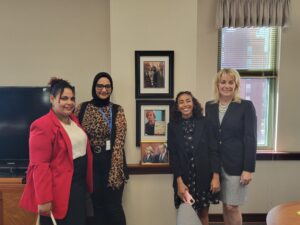
Delegates with Prosecutor Powers (right) with photos of the cold case trial.)
This was something that the delegates enthusiastically agreed with. No matter how hard they worked and no matter how many cases they won, their male counterparts would only mention their appearances. Prosecutor Powers showed the delegates pictures of herself during the case where she had worn suits to hide her femininity during that important case. She then said that if her male counterparts were only going to speak about her looks, then she would no longer hide behind boxy suits. This resonated with the delegates who mentioned that balancing their work and the sexist comments about their appearance was something that they often faced as well.
Prosecutor Powers mentioned at the end of the meeting that the attitudes towards women in the Hamilton County Courtrooms has greatly improved. Hamilton County now boasts about an even amount of women to men ratio in the legal system and it is widely accepted for women to be in the courtroom. Her advice to the delegates was, “Work hard, don’t give up.”
At the YWCA, the delegates learned about the Rising Star Program. This program aims to eliminate racism, empower women, and promote peace, justice, freedom, and dignity from all. Their program specifically focuses on non-profit board training, equity leadership, personal development, and sisterhood. One of the most influential model that the Rising Star Leadership focuses on is ‘Lift as you Rise.’ This model teaches women that as they rise through their career to help other women so that all women have equitable opportunities. Over the past 17 years, 600 women have graduated from this program.
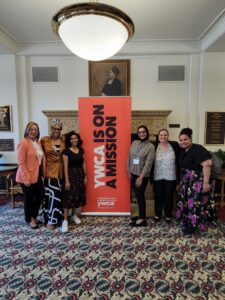
Delegates with President Rickell HowardSmith, Esq. (far left), Taylor Curtis (left), and Krisit Rohrkasse (middle right).
The three delegates found this interesting since NGOs in Egypt must have approval from the government. Often the government thinks that these organizations are working against them. This attitude affects advocacy campaigns and other outreach efforts. They can’t analyze or publish their own statistics, the penalty of doing so is a very hefty fine. All statistics must come from the government statistics center.
The delegates were very interested in this program and how they could use this model in Egypt.
Their meeting with the Hamilton County Commission on Women and Girls, led by Commissioner Denise Driehaus, was very enlightening for the delegates. They were very impressed by the proposed legislation requiring Ohio public schools, including community schools, to provide no-cost menstrual products in all female and gender-neutral bathrooms at schools serving grades 5-12. They were very happy to know that this legislation was passed for grades 6-12 since there was a similar efforts to pass legislation in Egypt in a campaign called ‘Necessity, not Luxury.‘ Unfortunately, the Egyptian government didn’t support this campaign. So women
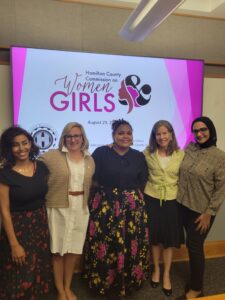
Delegates with Mary Maune and Commissioner Denise Driehaus.
took things into their own hands. Female pharmacists in rural and urban marginalized areas began to stock their shelves with free products so that women and girls had access to feminine products.
Our esteemed visitors were so impressed with the female leadership in Hamilton County with three female Commissioners, female sheriff, female auditor, three female county judges, nine female judges in the city of Cincinnati, female City Manager, female Vice Mayor, three female City Council Members, among others.
The last meeting was with the Cincinnati Bar Association– the Women’s Bar Association. The delegates met with a large group of women who were judges, law professors, attorneys, and legal assistants.
As Prosecutor Melissa Powers mentioned, the attitudes of the justice system were much different in 1975. One of the women in this meeting explained to the delegates that when she graduated from law school, she was told over and over that no firm, no client, no judge, and no jury would ever accept a woman in the courtroom. Fortunately, she found a program offered by the U.S. State Department to recruit and hire women in the justice system. They would train them as criminal prosecutors and work with juries. That was how she got into the legal field. She is glad to see that now there is a shift for the U.S. legal systems is trying to become more reflective of who we are as a society.
Other women in the meeting described the struggles they have endured as a woman of color in the legal system. One said, “Being the first and only is not new for me.” She described that she had to share herself so that her constituents would have confidence in her. This was not the challenge. She won her race. However, the challenge was getting her male colleagues to accept her. She now works passionately and diligently. At the time she was only the fourth woman to be elected to her court. Now, in that court there are six judges, there are five women and one man.
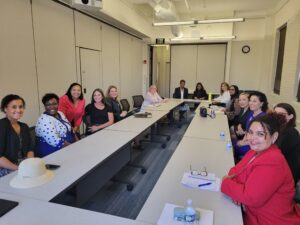
Delegation meeting with the Women’s Bar Association.
Another judge, a woman of color, mentioned that she is still always treated as an outsider and that she didn’t belong.
Overall, the consensus of the room was that while women in the justice system in Cincinnati/Hamilton County still face adversity and barriers that their male counterparts don’t, they are “blessed and grateful for their female colleagues.”Among the women, including the delegates from Egypt, there was a common sense and purpose.
So while women have made many strides in the justice system, with a current rate of about 50/50 female to male ratio in Cincinnati and Hamilton County, there are still many struggles and barriers that these women face. These issues are not just struggles faced by women here in our community. These are struggles that women all over the world face.
It was inspiring to hear from women who have paved the way for young women, especially young women of color. Every woman we spoke to had the attitude of the YWCA’s model, lift as you climb. We cannot rise if we do not bring every woman with us. We are more powerful together.
So for the young women who face adversary in their fields, let me leave you with parting advice given to us by several women over the course of our program:
“Don’t give up the fight.”
And remember, “Nevertheless, she persisted.”


